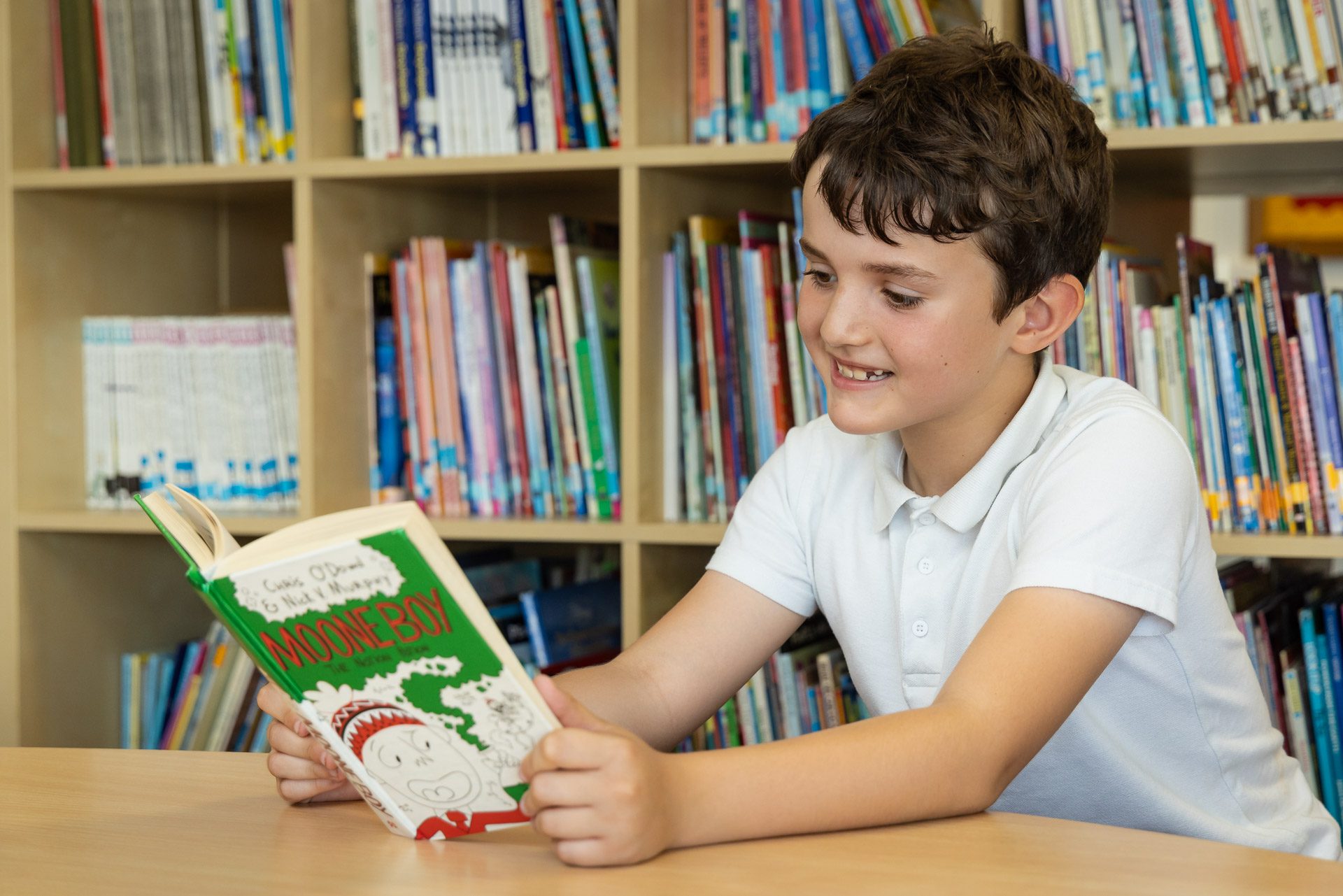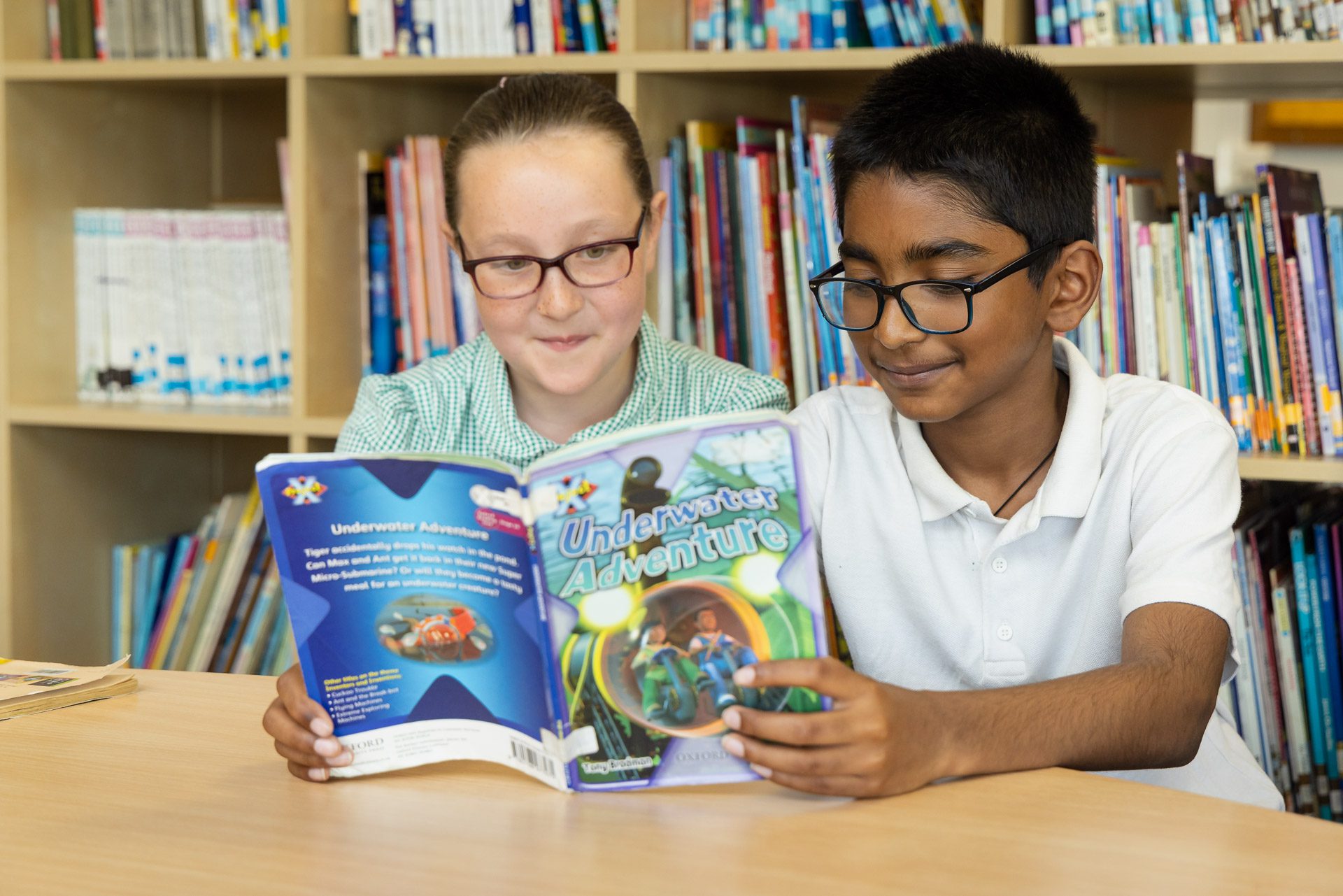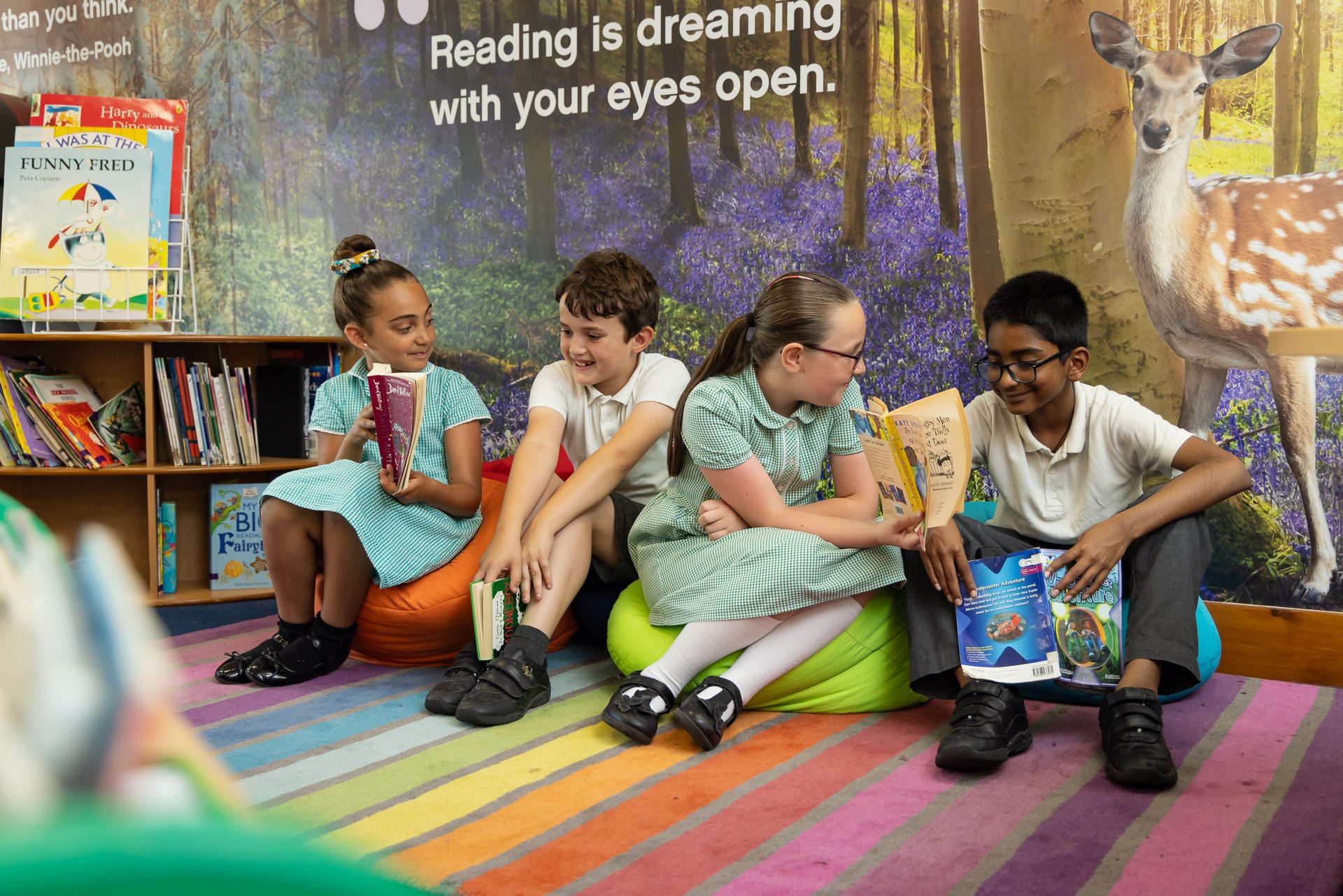English Reading Subject Leader: Miss R Gavin
Speech and Language: Miss G Nulty
For any more information on Stone St. Mary’s English Reading Curriculum, please contact the office.
At Stone St Mary’s we foster a love of reading and teach key reading skills, providing a challenge for all and promoting reading for pleasure. We aim to prepare pupils for life beyond the primary classroom so that they can read confidently, reaching their full potential.
Intent
Reading is a high priority at Stone St Mary’s and we take a consistent and rigorous approach when teaching it across the school. We aim to provide a range of exciting and inspiring experiences to encourage a love of reading – for life. Above all else, we want our children to enjoy reading and have the confidence to read independently, exploring a range of genres and authors. Across the curriculum, teachers carefully choose high quality texts linked to their topics, interests and to include a range of diversity.
Our ambition is that all children will read confidently, fluently and with good comprehension skills. We want them to read widely and often and take part in discussions about their favourite texts This will ensure that they reach their full potential, consider themselves to be a reader and can independently enjoy their reading learning journey.


Implementation
When children begin school in Reception, they follow a systematic phonics programme called Little Wandle. They read books matched to their phonics knowledge and choose books from a wide range of text types to promote a love of reading. We encourage families to share these books together. They are assessed regularly on their decoding and comprehension skills. Challenges are provided for the more able and additional support for those who need it. Children regularly read to adults individually and in small, guided reading sessions. They are taught the key reading skills, from our Stone Reading Toolkit:
- Decoding- using phonic knowledge to segment and blend sounds
- Retrieval – locating specific information from a text.
- Vocabulary- discussing words and phrases
- Inference – inferring character’s thoughts, feelings and motives and finding evidence in the text of this.
- Predicting- explaining what might happen from details stated and implied.
- Making links- using knowledge gained from other texts and authors.
- Summarising-Condensing the main ideas from more than one paragraph.
During guided reading sessions, all staff across year groups are timetabled to focus upon one class at a time, ‘flooding’ the class, so that all groups are supported.
We also promote the love of reading by providing a wide range of activities including daily story time in all classes, after school clubs linked to stories and reading, local book shop visits, reading challenges and teachers visiting different classes to share their favourite texts.
For more information and resources for Phonics, visit our Phonics page.
Impact
By creating reading rich environments across the school and promoting reading for pleasure, our children will:
- Read widely and often across the curriculum and be able to extract information from different genres of text. Children will be able to apply their phonics knowledge to decode unknown words and by re-reading texts, will gradually build their fluency.
- Reach their potential in all areas of the curriculum as they will be able to apply their reading skills to different subject areas.
- Learn new pieces of vocabulary and gain creative ideas from fiction texts. After listening to inspiring stories, children will be able to transfer ideas into their own writing and be motivated to use higher level vocabulary.
At the end of their Stone St Mary’s journey, our children will be able to articulate their ideas, take risks in their reading and have the skills to think creatively and be well equipped to take on future challenges as adults.

Reading Expectations
We have agreed on a set of reading expectations for each year group. These were created to help our children know which features they should use in all reading.
You may find these useful when supporting your child with their reading at home, encouraging them to try and use each of these key features.
English Reading in Each Stage
Systematic phonics is taught using the Little Wandle Revised Letters and Sounds scheme. Pupils are taught their sounds through daily sessions, learning how to segment and blend their sounds. Children are immersed in a wide range of stories, rhymes and poems. As well as reading books linked to the sounds they are learning, they are also encouraged to read another book of their choice, promoting the love of reading. They are encouraged to express their ideas, emotions and imagination after experiencing these rich and diverse texts. We regularly run workshops to inform parents of our teaching and expectations, encouraging them to support their children.
For more recommended reading, please visit the EYFS Class page
In year 1, pupils apply the phonic knowledge and skills they have been taught in year R to decode words and respond speedily with the correct sound to graphemes, for all 40+ phonemes. They gradually build up their confidence with fluency and word building. Pupils recognise and join in with predictable phrases and learn to appreciate rhymes and poems, reciting some by heart. They can participate in discussions about their reading, taking turns and listening to others, explaining their understanding.
In year 2 children can read familiar words quickly and accurately without overt segmenting and blending. They can discuss and express their views about a wide range of poetry and stories, at a level beyond which they can read independently. They are also introduced to non-fiction texts which are structured in different ways.
Children in LKS2 are introduced to a wide range of fiction, poetry, plays, non-fiction, and reference books. They read for a range of purposes and can also retell texts orally. There is a huge focus upon vocabulary, and they are taught to use dictionaries to check the meaning of new words. They can prepare playscripts and poetry to read aloud and perform, showing understanding through intonation and tone. Questioning is also encouraged to further their understanding of more complex literature.
In UKS2 pupils are encouraged to explain and discuss their reading, providing reasoned justification for their views. They can distinguish between statements of fact and opinion and build upon their own ideas. Texts are reviewed and recommendations can be made, with reasons given for their choices. A wide range of authors and texts are studied, including the classics. Pupils are encouraged to explain their understanding through formal presentations and debates, maintaining a focus upon a topic, using notes where necessary.
English Reading Progression
We have created the Stone Reading Toolkit so that children can focus on specific reading skills. This helps when reading to adults both individually and during guided reading sessions. Parents and carers will find the questions and sentence stem useful when discussing and questioning children about their reading.
At Stone St Mary’s we celebrate reading successes each term by holding a ‘Reading Cinema’. Three children from each class are invited to attend. They spend an afternoon enjoying a film with snacks provided as a reward for ‘shining’ in reading.
We continue to encourage children to read regularly by taking part in our Buster Book Club reading challenge. This is a weekly competition whereby classes record their home reading each week and compete to win a trophy…and sometimes a prize too!
SEND Information
Pupils are regularly monitored and assessed, with the more able readers challenged and those who require more support attending individual or group interventions. These are led by class teachers and support staff. Children with more specific needs may have personalised programmes, which are regularly shared with parents and carers. We also use a reading intervention programme; Building Reading Stamina (BRS) to support pupils not reading at the expected level to ensure they make accelerated progress.
Home Learning
The decodable reading practice book is taken home to ensure success is shared with the family. Reading for pleasure books also go home for parents to share and read to children. At Stone St Mary’s, we use the Little Wandle Letters and Sounds Revised parents’ resources to engage our families and share information about phonics, the benefits of sharing books, how children learn to blend and other aspects of our provision, both online and through workshops.
Children from Reception onwards have a home reading record. The parent/carer records comments to share with the adults in school and the adults will write in this on a regular basis to ensure communication between home and school. As the children progress through school, they are encouraged to write their own comments and keep a list of the books/authors that they have read. Children across the school have regular opportunities to engage with a wide range of Reading for Pleasure events (book fairs, author visits and workshops, national events etc)



